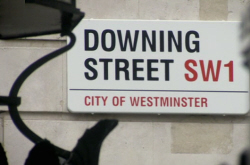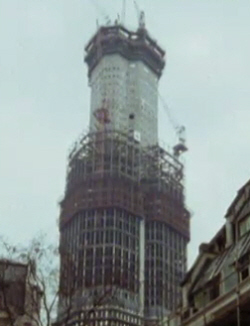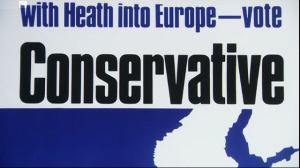Edward Heath - Conservative Party
He can helm a Yacht, but can he guide a Country?
Among those moving into new houses in the summer of 1970, one man, in London SW1, faced a particularly daunting redecorating
job. Like the gentrifiers of Islington, he had just moved into a rundown 18th century townhouse. And he was determined to drag it
into the 1970s, bringing in his black-leather armchair, his marble tables, his gleaming new stereo and the love of his life, his
Steinway piano. His name was Edward Heath.
And his address was number 10 Downing Street. Keen to banish every last taint of his hated rival, Labour's Harold Wilson,
Heath ripped out the dark-red carpets put in brand-new gold ones. In the Cabinet room, out went the battered leather armchairs
and the tatty, green-felt table, and in came a symphony of beiges and browns. Heath's friends told him that it looked stylish
and modern, like a cool bachelor pad. Most people thought it looked more like a boudoir.

But Ted Heath was like no Tory leader before. He wasn't public school and silver spoon. He was the son of a jobbing
builder from Kent. A self-made grammar school boy, he seemed a very modern kind of Conservative. The ideal man to lead
an affluent, meritocratic nation. Heath's victory had given him the chance to remake Britain an entirely modern lines.
There was no time to lose, right from the start, he was all business.

Edward Heath

Natwest Tower
This was Ted Heath's kind of place. Work on the NatWest Tower, as it was called, began in 1971. At the time, it was the
tallest building in Europe, a symbol of the blossoming power of the city of London. From his very first Cabinet meeting in
June 1970, it was clear that Heath saw himself as the clipped and businesslike captain of a tight but well-disciplined,
ship. In his own mind, he was more than just another grubby politician. He was the dynamic modernising chief executive,
who had been hired to turn around the fortunes of the vast, but struggling, family business.
At the top of his modernising agenda was an ambition that was to become the single-most controversial political issue of
our lifetimes. For what he wanted more than anything else was to get Britain into Europe. Heath had been committed to the
European ideal since his student days in the 1930s. He'd visited Spain during the Civil War. Witnessing Hitler's Nuremberg
rallies at first hand. As an artillery officer in the Second World War, he had seen for himself with the horrors of Nazism.
In the aftermath of the war, Heath had travelled across West Germany, witnessing the extraordinary rebuilding of a shattered
nation. The Germans might have lost the war, but they knew what was needed to win the peace - efficient industry run by clear-sighted
business leaders.
For Heath, western Germany offered a glimpse of Britain's economic future. By joining Europe's common market, Britain would
stake its claim to this economic miracle. This vision of Europe wasn't just about burying the hatreds of the past, it was about
building a new world, wealthier than ever before.

Heath's Europe Dream
Britain's businessmen loved the idea of joining the world's most lucrative single market. But were ordinary voters ready to
embrace Edward Heath's European dream? Well, that was another story.
The truth is that anti-European sentiment died hard. After all, it was only a quarter of a century since the end of the
Second World War. And when many people thought of Europe, they remember Agincourt and the Armada, Napoleon and the Kaiser.
Indeed, even in his own party, there were plenty of people who recoiled from his European enthusiasm. "I'd rather live in a
socialist Britain," said the Tory MP Alan Clark, "than one ruled by a lot of effing foreigners."
Heath might want us to be like the Germans, but first, he had to persuade the French. Unconvinced by our European credentials,
our wartime allies had twice blackballed British attempts to join their club. May 1971, Heath went to Paris for face-to-face talks
with the French president Georges Pompidou. In his eagerness to look European, Heath gave a speech that has gone down in political
legend, although perhaps, not quite for the right reasons. Heath's French was not convincing.
Perhaps never before had the language of Voltaire been subjected to such a battering. But while Heath was hardly one of history's
great linguists, his speech had sent an unmistakable message. And that message was, "can we join your gang, please?" With the French
onside, he now had to get the legislation through Parliament. And with both main parties deeply divided, passions for and against
were running high.
But in October 1971, the Commons backed Heath.



